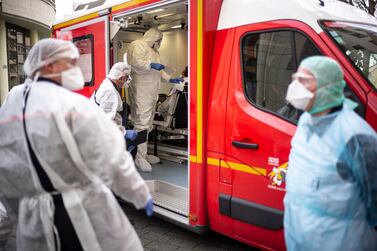For a scientist who has written a recent novel on an apocalypse in which life on earth ground to a halt, Baghdad-born Jim Al-Khalili strikes a very determined and optimistic tone when looking at the Covid-19 pandemic.
The quantum physicist and popular science broadcaster retains his faith that research will provide a route out of the global lockdowns, though maybe not a full escape path until next year.
Speaking to The National from his home on the southern coast of England, Professor Al-Khalili warns of the pernicious impact of anti-vaccine campaigners as scientists seek to offer protections. "I'm an optimist and the fact there are so many research groups and labs and organisations working on different types of vaccines, and at different fronts, means I do think the time [to vaccination] will be cut," he said.
The dangers posed by conspiracy theorists and other campaigners can’t be countered by a lockdown, however, given that social media platforms are operating as before.
“I’m sure there are many people who will refuse to be vaccinated against the coronavirus, arguing that it's their choice, it’s their right. As we saw with the MMR issue and the return of something like measles, we can’t afford for people to hold these crazy notions,” he added.
Using his newly-released book “The World According to Physics” as a reference point, @jimalkhalili will offer an illuminating look at what physics reveals about the world. Register for the webinar today: https://t.co/VHdmwW3O1v #physics #quantumbiology @PrincetonUPress pic.twitter.com/3jRWh0qkxZ
— NYAS (@NYASciences) April 18, 2020
“It’s very frustrating. We know already even before the pandemic that conspiracy theorists seem to have found their voice on social media like never before. Some of these conspiracy theorists and pseudo-science people are just cranks and they don’t have any effect on society but the idea that certain medications will cure the virus or, worse, that somehow it’s linked to 5G masts - that is dangerous
“We should probably take them more seriously and be prepared to step up and debunk some of these ideas," he added. “Putting out the fires isn’t as quick as they spread.”
The 2019 novel Sunfall written by Professor Al-Khalili saw a scientific team fight an evil conspiracy to wipe out the human race when the earth’s magnetic shield was turned off.
While he has spoken often of a peripatetic childhood as the son of an Iraqi air force officer — the family had lived in Baghdad, Kirkuk, Mosul, Baghdad and Saddat al-Hindiyyah by the time he left his homeland as a teenager in 1979 — Professor Al-Khalili has remained rooted in and around the city of Portsmouth since his student days.
Theoretical physics is still his day job but since starting the radio programme The Life Scientific on the BBC in 2011, he has interviewed scientists well beyond his specialist field. Guests have included many of the most notable players in the British response to the pandemic, names such as Sir Patrick Vallance, the chief scientific officer, and Sir Paul Nurse, the head of a leading research body, was featured in the first episode.
The British government has come under fire for allowing six weeks to elapse in February and early March before entering lockdown. Critics fear that the country’s failure to choose a so-called “go early, go hard” strategy against the spreading infections cost time and resulted in a spiralling death toll.
Officials state, however, that the politicians have followed the scientific advice carefully. While professing “not to be the greatest fan” of the current government, Professor Al-Khalili has not much patience with a blame game.
“The epidemiologists and the immunologists can give evidence on their expertise but those who are making the decisions on policies must listen to other evidence as well which may lead to a tension in their decision making,” he said.
“In science, we don’t talk about facts, we talk about our current best understanding. You can only develop models based on hypothesis as more and more data comes in.”
However, the idea that countries could rely on developing herd immunity from the coronavirus when around 60 per cent of the population has been infected is something that Professor Al-Khalili regards with horror.
“My view is that was never something that could be justified, certainly on moral grounds,” he said. “It would mean a heck of a lot of depression, unemployment and mental health issues just because of the sheer number of fatalities if any country were truly to pursue that policy or decision.”
With a continuing ability to record The Life Scientific programme, conduct virtual learning sessions with his students and webinars with institutes around the world, Professor Al-Khalili said he has been made very aware of his privileged position by the lockdown. That said, he is trying to contemplate how the coronavirus will alter daily routines and wider social relationships.
“Life absolutely won’t be the same again,” he said. “The one thing I find amusing is will we be comfortable about not social distancing? Are we always going to be side-stepping as someone walks past?
“It may be novel to begin with but I can’t imagine that it would last.”







